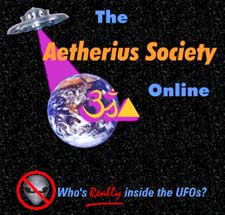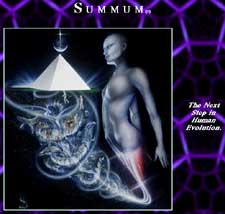


May 8, 1997
The search for spiritual fulfillment, whether in the form of a god or a set of beliefs, is as old as the species. It has tamed societies, nurtured civilizations, launched wars and played muse to philosophers and artists. Now the age-old quest is making its way, sometimes in a bizarre fashion, to the World Wide Web.
 Cyberspace is emerging as the staging
platform of choice for religious fringe groups to dispense their precepts, raise
money and -- if their critics are to be believed -- recruit new members.
Cyberspace is emerging as the staging
platform of choice for religious fringe groups to dispense their precepts, raise
money and -- if their critics are to be believed -- recruit new members.
While the Web sites mounted by the vast majority of religious fringe groups do not overtly encourage actions as extreme as those of Heaven's Gate, whose leader and 38 followers committed mass suicide this spring, many share the basic beliefs of Heaven's Gate -- an aggregation of ancient mysticism, extraterrestrial redemption, modern Eastern and Western religious doctrines and millennialism.
For example, Stargate and the International Raelian Movement link God, alternative lifestyles and alien life forms. Until now, they and groups with similar beliefs have been geographically isolated curiosities, but with the emergence of the Web as a populist medium for publishing and distribution, these groups are finding each other and reaching out to proselytize.
Return to |Top |
Though no one appears to be monitoring such groups online, their recent proliferation on the Internet suggests that their presence is widespread and growing.
With the discovery on March 26 of the suicides by members of Heaven's Gate, many Americans expressed shock that a sect espousing extraterrestrial redemption could lure people to leave families and careers and, in the end, to take their own lives in an act of faith that strikes most people as preposterous. The grip of that faith, however, was underscored again on Tuesday, May 6, 97, when two more members attempted suicide, one successfully.
None of the Web sites visited while preparing this article appeared to encourage such extreme behavior. In fact, some attacked Heaven's Gate for its belief that the souls of members would be united with extraterrestrials aboard a spaceship hiding in the tail of the Hale-Bopp comet.
For example, The Aetherius Society describes itself as an "international spiritual brotherhood dedicated to world peace and enlightenment" whose members "have been actively cooperating with spiritually advanced extraterrestrials since 1954." Its Web site offers this advice to visitors:
Don't look for a spacecraft following Hale-Bopp, and don't expect the second coming or the end of the world to follow either. The Aetherius Society believes in many things which remain foreign to modern science, however it is important to use all of one's mental resources when looking at new theories, not just imagination and hope. Remember the time-proven examples from the past.
 Even so, the beliefs to which
these groups adhere can be quite unusual, sometimes outright bizarre. Most such
groups realize this and counsel visitors to their sites to maintain an open
mind.
Even so, the beliefs to which
these groups adhere can be quite unusual, sometimes outright bizarre. Most such
groups realize this and counsel visitors to their sites to maintain an open
mind.
"Some of the concepts may appear strange, and contrary to current scientific and religious thought," the Aetherians admit in a message on their site. "Remember, a few hundred years ago the most advanced scientific and religious minds of the era were adamant that the Sun revolved around the Earth!"
Return to |Top |
The Internet provides these fringe groups an easy way to disseminate information and to detail their histories, philosophies and beliefs. Increasingly, they are investing in Internet technologies not just to attract new members but to sell books, pamphlets and other products and to advertise classes they offer. A few appear to have set up shop in cyberspace simply to reveal their wisdom to their fellow humans.
"I like computers, I like the Web, and I felt it would be a real nice way to get our teachings out to a broader base," said Brian Keneipp, 40, the webmaster for The Aetherius Society. "Basically what we are is a new religion, started in 1954 by Sir George King. He pretty much combined Christianity, yoga, UFOs and the truth behind all the major religions and how that is related to karma. It is all tied together."
Keneipp, a former AT&T employee, said he "finally found a niche" with the group when he was 21 and moved to California in 1978 to join up. The Aetherius Society, which is based in Los Angeles, has branches in Detroit, Toronto, London, New Zealand, Nigeria and Ghana, among other places, he said.
"We aren't a real computer-savvy group," Keneipp said, "although we are getting our accounts online and our newsletter." He said that the group's home page had received about 6,000 hits since launching the site about two years ago, mostly from people who wanted to order the group's books and audio tapes.
The site is filled with images of UFOs and Buddhist temples, cryptic script and lists of "cosmic teachings" and "cosmic concepts" like "radionics." Short essays carry titles like "Abductions: Some Surprising Answers" and "Spiritual Pushes -- What are They?" It is similar to the sites of many other fringe religions on the Web in its combining elements of Western and Eastern philosophies with a belief in spiritual revelations by extraterrestrial beings. Not all these groups are as candid about their precepts. For example, Unarius, a group headquartered in El Cajon, Calif., is much more mysterious.
 "We are an academy of science,"
said a Unarius volunteer named Dorothy, a retired secretary who would not reveal
her last name. She said she began to work for the group when she was widowed
"a while back."
"We are an academy of science,"
said a Unarius volunteer named Dorothy, a retired secretary who would not reveal
her last name. She said she began to work for the group when she was widowed
"a while back."
"It is very advanced," Dorothy said, "not just something people would read about, except those interested in science; we teach about outer space -- what's out there and why you are here. It is a beautiful science."
Return to |Top |
As for why the group chose to create a Web site, she said: "That is the wonderful thing about the Internet -- people can find out about us. If you don't have Internet, you are just out of the system." Dorothy said that one purpose of the site is to advertise and sell 145 book titles marketed by Unarius Publishing.
The extensive Unarius site offers a statement of purpose from the director, Dr. Charles Spiegel, as well as information on the group's "Pathway to Light" seminars and workshops, a section on "The Extraterrestrial Connection" and a "video and cablevision guide" to the group's television programming.
Unarius was founded in 1954 by Ernest and Ruth Norman, who claimed to be reincarnations of Socrates, Charlemagne, Quetzalcoatl and Jesus, among other eminent historical figures. A main thrust seems to be the promotion of a theory that there are people living underground on Mars.
In another corner of the Web sits the obelisk-pillared temple of Summum, a group that also shares many of the beliefs of Heaven's Gate -- with one very big exception: Instead of practicing sexual abstinence, Summum members try to have sex as often as possible. The site sells a special "nectar" that members say enhances sexual relations.
"I found out about Summum in 1977-78 ," said the group's webmaster, Bernie Aua, a 38-year-old resident of Santa Ana, Calif. "I met our leader, Corky, giving a lecture at the University of Utah, which I found intriguing. I was involved on and off, and in 1984, I joined."
The group's name, Aua said, is Latin for sum total -- or as he defines the concept, "all of creation." "Summum does charitable projects to help out the needy," Aua said. "For a few years we farmed in southern Salt Lake County. We raised vegetables and donated all of it to the food banks."
Aua, who works as a technical support manager for a computer company, said he set up the group's Web site as "a means to promote and help people know about Summum." "We get a lot of hits," Aua said. "Right now, we are averaging 15,000 a month. The site will have been up two years come June. I can't be certain what these people are getting out of it, but I do occasionally get e-mail saying that people find the site fascinating. The Salt Lake main office gets calls for the books and for more information. Since we are a nonprofit organization, we do rely on support."
Perhaps the feature that most distinguishes the Summum site from other fringe faiths on the Net is the offer to have the group bronze the mummified remains of pets for $4,500.
"Mummification is part of the Summum philosophy, as far as death and dying goes," Aua said. As for the cost, he said, "bronze is a very good metal, it lasts, but it is expensive." The group will also bronze human remains, he said.
Most of these groups do not aggressively seek converts, at least not overtly. Instead they appear to focus on simply trying to spread their wisdom and do a little ad hoc fund raising.
The Aetherius Society's Keneipp said: "I think the best advantage of the Web is it's a kind of library. If someone in Duluth found out about The Aetherius Society and they were interested in learning more, if there was a Web site with our information they could easily do this."
But he added that cyberspace is a vast and growing area, and unless people know where they're going, it's not likely they will ever find the Aetherius site.
Return to |Top |
"You know, it is difficult to find things on the Web," Keneipp said. "I don't necessarily see it as a source of first contact; its more of a follow-up without a lot of hassle."
While these fringe religions consider themselves keepers of enlightened spirituality, many non-members consider them cults and have launched Web sites to monitor their activities and offer support to families of members and to members themselves. Some of these sites specialize in information on "deprogramming" members of unusual sects.
For example, The Cult Awareness Information Centre, headquartered in Brisbane, Australia, offers personal stories of former cult members, links to personal home pages of former members and phone numbers for local and national support groups.
Another such group is the International Cult Education Program, sponsored by the American Family Foundation, a national, secular, nonprofit organization in New York City that sponsors academic research and recovery services for people wishing to leave groups.
Marcia Rudin, 56, the director of the foundation's education program, said Wednesday that she was not surprised by the many fringe religious groups popping up on the Internet.
"Like everyone else, they want to keep up with the latest form of mass communication," Rudin said. "They use their Web sites not just to disperse information and ideology, but as a recruitment tool. We have many personal stories of people recruited via the Internet."
Rudin said that her organization suspects that "on the Internet, cults are reaching a more vulnerable population."
"People on the Internet are lonelier, they are at home, they are on line, and that might make them more vulnerable," Rudin said. At this point, she concedes, that's just speculation because there have been no formal studies about how many cult members are recruited online.
"The good news is, we can get our information out on the Internet, too," Rudin said. "We have had so many people reach us through the Internet asking for help with an indoctrinated family member or loved one. Like any technology, it can be used for bad or for good. I think we're providing our preventive duty by having our information out there; it has enabled us and ex-members to get the word out."
Related Sites
Following are links to the external Web sites mentioned
in this article.
* International Raelian Movement
* The Aetherius Society
* Unarius
* The Cult Awareness Information Centre
* Summum
* International Cult Education Program
Copyright 1997 The New York Times Company